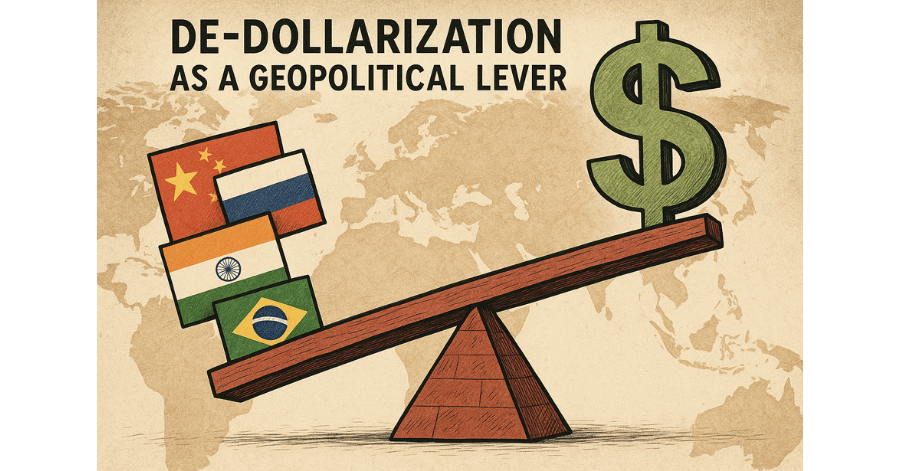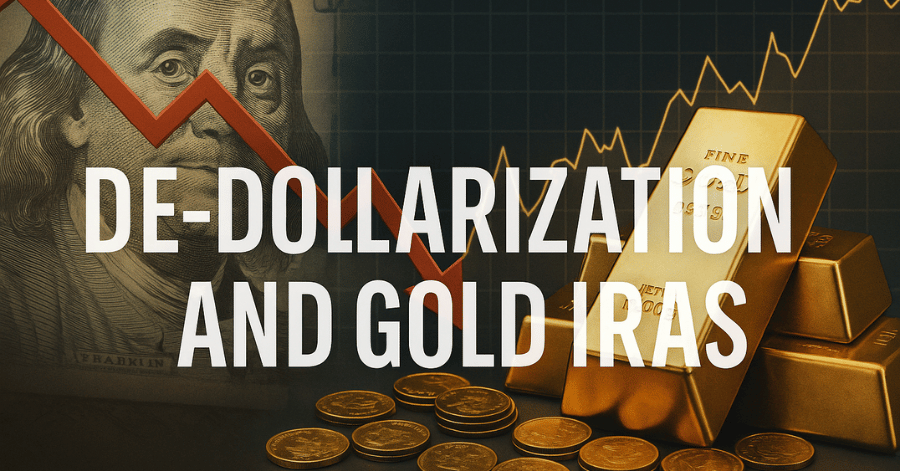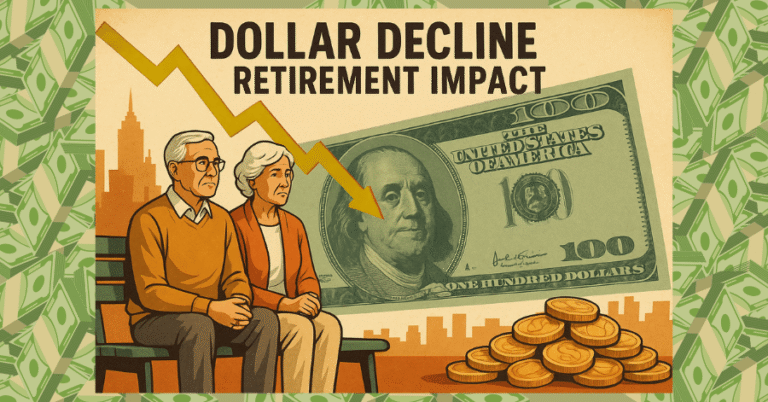Key Takeaways:
- De-Dollarization as a Geopolitical Tool: The “Rio Reset” highlights a strategic push by BRICS nations to reduce reliance on the U.S. dollar, aiming to increase their economic sovereignty and shift global power dynamics.
- The Dollar’s Declining Global Role: A measurable impact of these currency shifts is the U.S. dollar’s shrinking share of global reserves, which has fallen from over 70% to approximately 58%.
- New Alliances and Trade Blocs: As nations trade more in local currencies, new economic alliances are strengthening, creating different centers of economic gravity and challenging the established world order.
- Increased Risk for Your Portfolio: These global currency shifts create volatility for dollar-denominated assets and could increase domestic inflation, posing a direct risk to traditional retirement savings.
- Diversification as a Protective Strategy: To protect against this instability, the article suggests diversifying retirement portfolios with tangible assets like precious metals, which have historically served as a hedge during currency realignments.
Affiliate Disclosure: To support our mission of providing valuable financial analysis, this page may contain affiliate links. If you follow a link and make a purchase, we may earn a commission at no additional cost to you. We only recommend partners we thoroughly research and trust.
Read Our Article: Rio Reset Dollar Shakedown
 Is Gold Your Retirement Shield?
Is Gold Your Retirement Shield?
Introduction
The upcoming “Rio Reset” summit isn’t just about financial ledgers and payment systems. It’s a chessboard where the pieces of global power are in motion. BRICS nations and other emerging economies explore alternatives to the long-dominant U.S. dollar. The resulting currency shifts & geopolitical impact could redraw maps of influence, forge new alliances, and challenge the established international order.
Understanding these undercurrents is key to navigating what many are calling a new era in global relations. Where economic policy and international standing increasingly intersect, nations find their global influence shaped as much by fiscal and trade choices as by diplomatic initiatives.
Today’s economy reflects this reality, as shifting policies, trade tensions, and geopolitical uncertainty directly impact a country’s reputation and leverage on the international stage
De-Dollarization as a Geopolitical Lever

 The push for de-dollarization, a central theme of the Rio Reset, stems from a deliberate geopolitical strategy. Many nations aim to reduce their reliance on the U.S. dollar to gain greater economic sovereignty. By shifting away from the dollar, these countries seek to protect themselves from U.S. foreign policy tools, especially financial sanctions.
The push for de-dollarization, a central theme of the Rio Reset, stems from a deliberate geopolitical strategy. Many nations aim to reduce their reliance on the U.S. dollar to gain greater economic sovereignty. By shifting away from the dollar, these countries seek to protect themselves from U.S. foreign policy tools, especially financial sanctions.
“Exchange rate policy is inherently political,”. Noted by Professor Jeffry Frieden of Harvard University. This highlights how a currency’s value and stability are strongly influenced by government actions.
Countries like China and Russia advocate for increased trade in national currencies. They are actively working to diminish the “exorbitant privilege” the U.S. has enjoyed due to the dollar’s global dominance.
Affiliate Disclosure: To support our mission of providing valuable financial analysis, this page may contain affiliate links. If you follow a link and make a purchase, we may earn a commission at no additional cost to you. We only recommend partners we thoroughly research and trust.
Reshaping Alliances and Trade Dynamics
Significant currency shifts & geopolitical impact can be seen in the formation and strengthening of economic blocs. As nations begin to trade more in their local currencies or through alternative payment systems, their economic interdependence deepens. This potentially leads to new strategic alliances.
The BRICS expansion itself is a testament to this trend. This redirection of trade and investment along new geopolitical lines can alter established trade balances. Also, create new centers of economic gravity.
For Example:
Increased use of the renminbi in trade invoicing/euro in regional transactions could gradually chip away at the dollar’s ubiquity.
Challenges to Global Governance and Potential for Instability
A move towards a multipolar currency world, while potentially offering balance, also presents challenges. It could strain existing international financial institutions and necessitate reforms in global economic governance. The transition period itself can be marked by increased volatility and uncertainty in foreign exchange markets. As history shows, major geopolitical events often trigger significant currency movements. A concerted challenge to the dominant global currency could be such an event, with far-reaching consequences.
Frequently Asked Questions: Rio Reset & De-Dollarization
When will we see the actual effects of de-dollarization?
The timeline varies by region and sector. Some changes are already happening – BRICS countries increased local currency trade by 60% in 2024. However, a complete shift away from dollar dominance would likely take 10-20 years, as it requires building new financial infrastructure, payment systems, and establishing trust in alternative currencies.
What specific payment systems are BRICS countries developing to replace SWIFT?
Several alternatives are emerging: China’s Cross-Border Interbank Payment System (CIPS), Russia’s SPFS, and ongoing discussions about a unified BRICS payment platform. These systems allow countries to conduct international transactions without routing through US-controlled infrastructure, reducing dependence on the dollar-based system.
How will this affect everyday Americans at the grocery store or gas pump?
Initially, most Americans won’t notice direct changes in daily purchases. However, if de-dollarization accelerates, it could lead to higher import costs (making foreign goods more expensive), increased domestic inflation, and potentially higher interest rates as demand for US Treasury bonds decreases.
Are there historical examples of similar currency transitions?
Yes, the most notable is the decline of the British pound after World War II, when the dollar gradually became the dominant reserve currency. This transition took about 20-30 years. However, today’s situation is unique because it involves coordinated efforts by multiple large economies rather than a single country’s decline.
What happens to countries that remain neutral – neither pro-dollar nor pro-BRICS?
Neutral countries may benefit from increased optionality, able to trade in multiple currencies depending on the transaction. However, they also face complexity in managing multiple currency exposures and may need to maintain larger foreign exchange reserves to hedge against volatility.
Will this affect the US government’s ability to finance its debt?
Potentially yes. Reduced global demand for US Treasury bonds could make it more expensive for the US government to borrow money, leading to higher interest rates on government debt. This could impact federal spending priorities and domestic economic policy.
How does this impact other major currencies like the Euro or Japanese Yen?
Other major currencies could benefit as countries diversify away from the dollar. The Euro, in particular, might see increased usage in international trade. However, these currencies also face their own challenges and may not be ready to handle dramatically increased global usage without their own economic adjustments.
Conclusion:
The currency shifts & geopolitical impact stemming from initiatives like the Rio Reset are profound and multifaceted. They signal not just an economic adjustment but a potential realignment of global influence and power structures. Navigating this new world order will require a keen understanding of how monetary policies, trade relationships, and geopolitical ambitions intersect.
For individuals considering how these macro trends affect their financial landscape. Our main guide, “Rio Reset Dollar Shakedown: Is Gold Your Retirement’s Unseen Shield?”. Offers further context.







One Comment